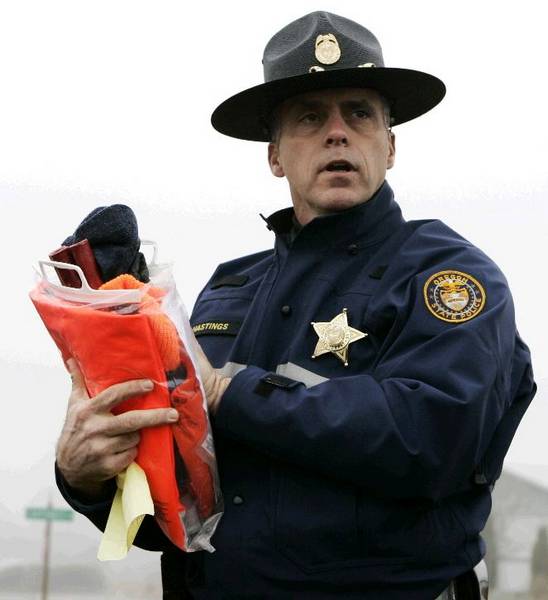Be prepared: Helpful tips to follow if you plan to travel through remote wilderness areas

ALL |
1. Always let people close to you know your projected travel route and when you expect to depart and arrive at your destination. Call in with these people when you stop to let them know where you are. If you get stranded or wind up missing, this information can save your life.
2. Consider purchasing a cell phone charger for your car, if you use a cell phone. Keep your cell phone well charged at all times.
3. Keep a “coffee can survival kit” in your car. It consists of:
— A two or three pound coffee can with a seal, with three holes punched equal distances apart in the rim. All of your items will be stored in this can.
— A long length of twine or other heavy string Ð this can be used for a variety of things, including suspending the can, through the punched holes, and to hang wet clothing on.
— Several large safety pins.
— A candle 2 inches in diameter – not a taper candle.
— A reasonably sharp pocketknife or scissors.
— Several pieces of bright cloth that could be used to tie to an antenna or door handle.
— Several packets of soup, hot chocolate, tea, bouillon cubes, and other assorted food that can be reconstituted using melted snow to provide nutrition.
— Plastic cutlery.
— A few small packages of peanuts and fruit-flavored candy like orange slices or jellybeans Ð avoid chocolate.
— A pair of warm socks and gloves Ð avoid cotton because it does not provide good insulation when wet.
— Two packages of book matches, preferably in a waterproof container or Ziploc baggie.
— One sun shield blanket or 2 large green or black plastic leaf bags to reflect body heat.
— A penlight and batteries (keep them separate).
— Two quarters and two dimes for telephone calls, or a prepaid long distance card.
4.This kit should be kept in the car at all times, even during the winter. You can supplement this kit by keeping other items in the car or in a kit, such as:
— A large plastic garbage bag.
— Several plastic bottles of water.
— A pencil stub and paper Ð ink can freeze or explode in pens if the temperatures get low enough.
— A plastic whistle.
— Spare, warm clothing – if you routinely have several people in the car, consider putting several items of spare clothing in your car.
— Long underwear.
— A warm hat.
— A fleece or wool sweater and pants.
— Sleeping bag(s) or blankets.
— A large stainless camp cup.
— A flashlight and batteries.
— Meals, Ready to Eat. Military versions of this compact, ready to eat food provided by the government are not available for retail sale; however, very close approximations are available at military surplus stores and online. These meals provide nutrition and store well, and require no cooking.
— A small first aid kit, including Ace bandages.
— A multi-purpose tool such as a Swiss Army Knife or a Leatherman.
— A tool kit including screwdrivers, needle-nose pliers, channel lock pliers, a crescent wrench, jumper cables, a tow chain, tire chains, spare fuses and belts, an assortment of screws, nuts, washers and bolts, flares, baling wire, spare motor oil, transmission fluid, antifreeze, and brake fluid, a small shovel, and sand or cat litter for tire traction.
— Windshield de-icer and a scraper.
— Hand warmers.
— Ski goggles.
— Compass.
— Road maps.
— A book or magazine you would be interested in reading and a deck of cards.
5. If you do wind up being stranded, it is important to stay in your vehicle and to stay warm and dry. Unless you know for sure that your exhaust system is not damaged and the tail pipe is clear, avoid running the engine for long periods of time as it may blow carbon monoxide into the car’s body. Do not leave the area around your car to walk for help. Do not attempt to dig out your car without several layers of warm clothing on, and a hat and gloves. If you do leave your car, consider a tie line – keep one end of the cord tied to your car antenna or door handle, and the other tied to your belt or wrist, so that you can find your way back during a snowstorm.
Sources: TheCarConnection.com, 21stCenturyAdventures.com, WDOT.Wisconsin.gov, wsdot.wa.gov

Support Local Journalism

Support Local Journalism
Readers around the Lake Tahoe Basin and beyond make the Tahoe Tribune's work possible. Your financial contribution supports our efforts to deliver quality, locally relevant journalism.
Now more than ever, your support is critical to help us keep our community informed about the evolving coronavirus pandemic and the impact it is having locally. Every contribution, however large or small, will make a difference.
Your donation will help us continue to cover COVID-19 and our other vital local news.










